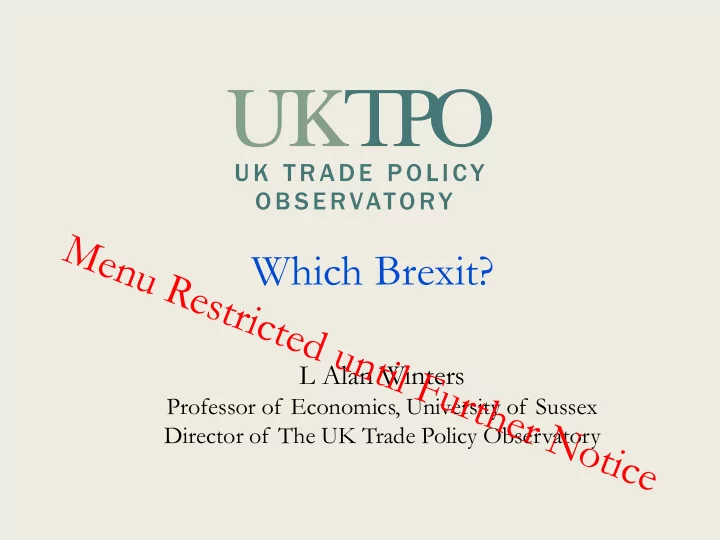

Which Brexit? L Alan Winters Professor of Economics, University of Sussex Director of The UK Trade Policy Observatory
Correcting the Focus on Gross Exports • Imports are what confers welfare • The terms of trade matter as much as exports – Devaluation is NOT the answer • Value added = incomes: net out imported inputs • Trade policy operates on gross flows – cumulate • Who/where the incomes accrue matters 74
Day 835: where are we now? Where we started: • ‘No deal’ – Planned – chaotic • Canada (+++?) • Norway (EEA) 75
Day 835: where are we now? • And now: • ‘No deal’ – Planned – chaotic • ‘Super’ Canada • ‘Super- Chequers’ • Norway (EEA) • Remain 76
The Political Complexities • EU seeks legally binding Withdrawal Agreement – Citizens, budget, all-Ireland economy (Single Market) – December’s Backstop for Northern Ireland • disowned by UK, • It should be covered by the long-term trade deal • Trade is to be covered by a political declaration – How binding? Trust – UK divided about what goes into it. 77
Chequers (White Paper) I • Free flow of goods with the EU – Tariff-free access – Regulatory alignment for border checks • But nightmarish ‘Facilitated Customs Arrangement’ – Track imported goods – ROOs applied internally – Origin checks ‘around the country’ when t UK > t EU 78
Chequers (White Paper) II • Independent Trade Policy? Barely, because of FCA • Little commitment on ‘non-border regulations’ – Working conditions, environmental practices, …. – Only firm commitment is on state aids • Little on services – ‘Not have current levels of access’ – Avoiding ‘unjustified barriers or discrimination’ – Coverage in line with the GATS • Labour mobility – little; matter of trade not of labour markets 79
Super-Chequers I • Free flow of goods with the EU – Tariff-free access – ??? Regulatory alignment for border checks ??? – Single Market in Northern Ireland (sea-route checks) • But nightmarish ‘Facilitated Customs Arrangement’ – Track imported goods – ROOs applied internally – Origin checks ‘around the country’ when t UK > t EU 80
Super-Chequers II • Independent Trade Policy? Services only (unrealistic) • A bit more commitment on ‘non-border regulations’ ?? – Working conditions, environmental practices, …. – Only firm commitment is on state aids • Little on services – ‘Not have current levels of access’ – Avoiding ‘unjustified barriers or discrimination’ – Coverage in line with the GATS • Labour mobility – little; matter of trade not of labour markets 81
Why does ‘no services’ matter? • Bundling services and goods in exports • Movement of labour significant here 82
Why ‘no services’ upsets the EU • Cheaper services that EU – competitive advantage in goods • Bundling services and goods in exports Complexities in providng packges – • Northern Ireland in EU and UK Single Markets UK SM London -- Belfast -- Dublin -- Paris etc SC 83
But Chequers will evolve – or die Towards ‘WTO’ rules or Super-Canada Towards EEA Towards the EEA • Full goods integration? • Services integration • Labour mobility • CJEU • EEA (Norway) 84
Towards Super-Canada = Chequers + problems: Border formalities for • Irish Border lorries • Rules of Origin – 1 hr to decide if • Border formalities paperwork checks – Disruption necessary – Time in transit – 3hrs if paperwork – Paperwork checks – All → Risks – 5 hrs if physical check • Less cooperation 85
Towards Super-Canada But = Chequers + problems: • Cleaner conceptually • Less cooperation and administratively • Irish Border • More freedom • Border formalities and expense – Disruption – Time in transit • Can sign FTAs – Paperwork • Can coordinate – All →Risks regulations, e.g. USA 86
How scary is Super-Canada? A Survey • Industrial product supply sector*: – Turnover £148 billion, – 1.1 million employees and – approx. 20% of UK goods exports • 34 questions • 20% response rate • Interviews with a diverse sample of firms of varying sizes and sectors * EURIS ‘S ecuring a competitive UK manufacturing industry post Brexit ’, 12 th September 2018 87
Key Results • Over half of respondent’s product sales are intermediate inputs • Over three-quarters of firms supply to over 50 other firms • 83% of respondents would prefer to stick with EU regulation. Only 11% want weaker • Unpredictable delays at borders would be a significant or major cost for 77% of firms 88
More key results • 83% of respondents import inputs from the rest of the EU. • Imports are over 75% of costs for 1 in 5 respondents • 37% of respondents don’t know if their products would satisfy EU rules of origin • 57% of respondents don’t know who their tier 2 and tier 3 suppliers are 89
Thank you https://blogs.sussex.ac.uk/uktpo Follow @uk_tpo 90
Recommend
More recommend